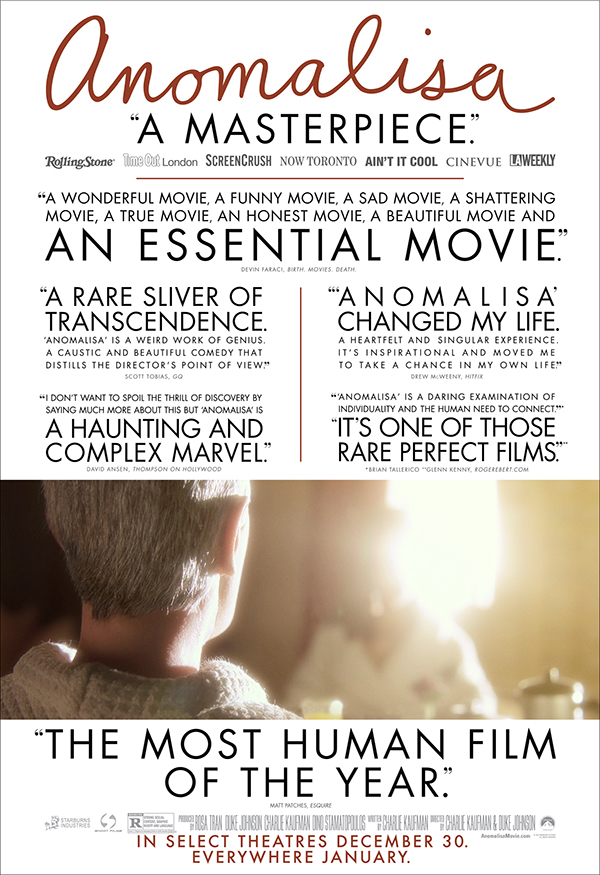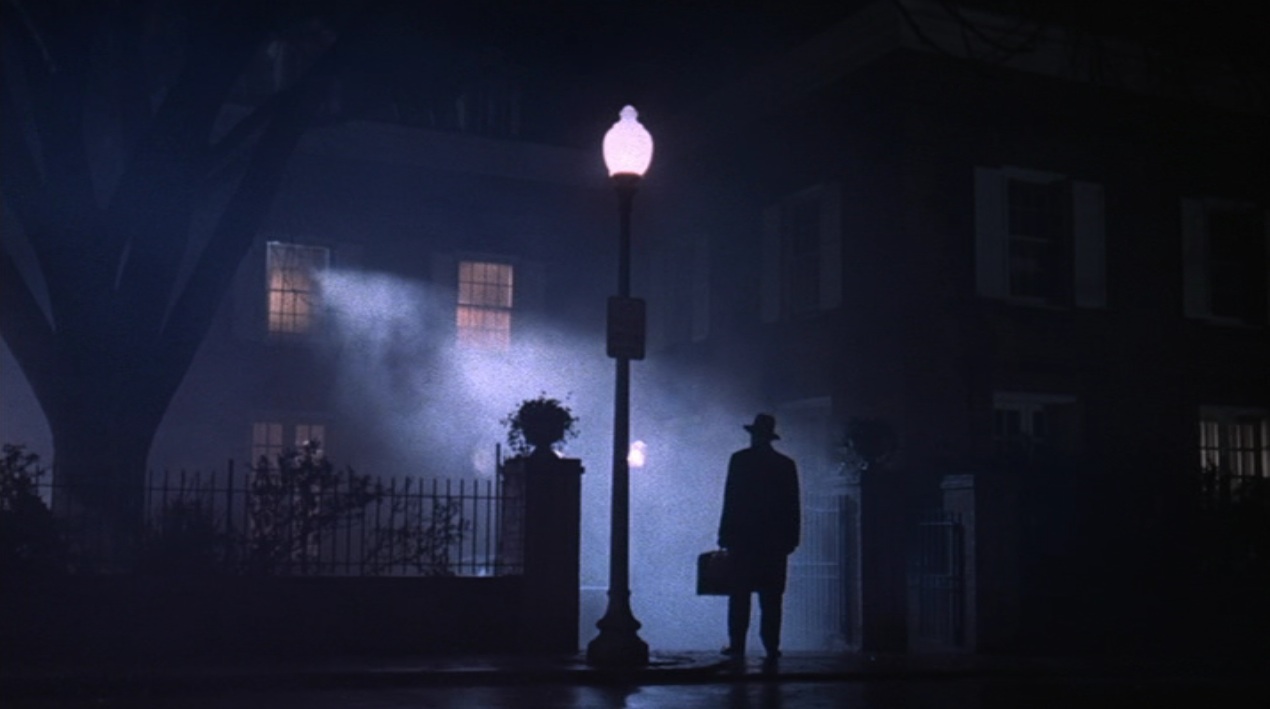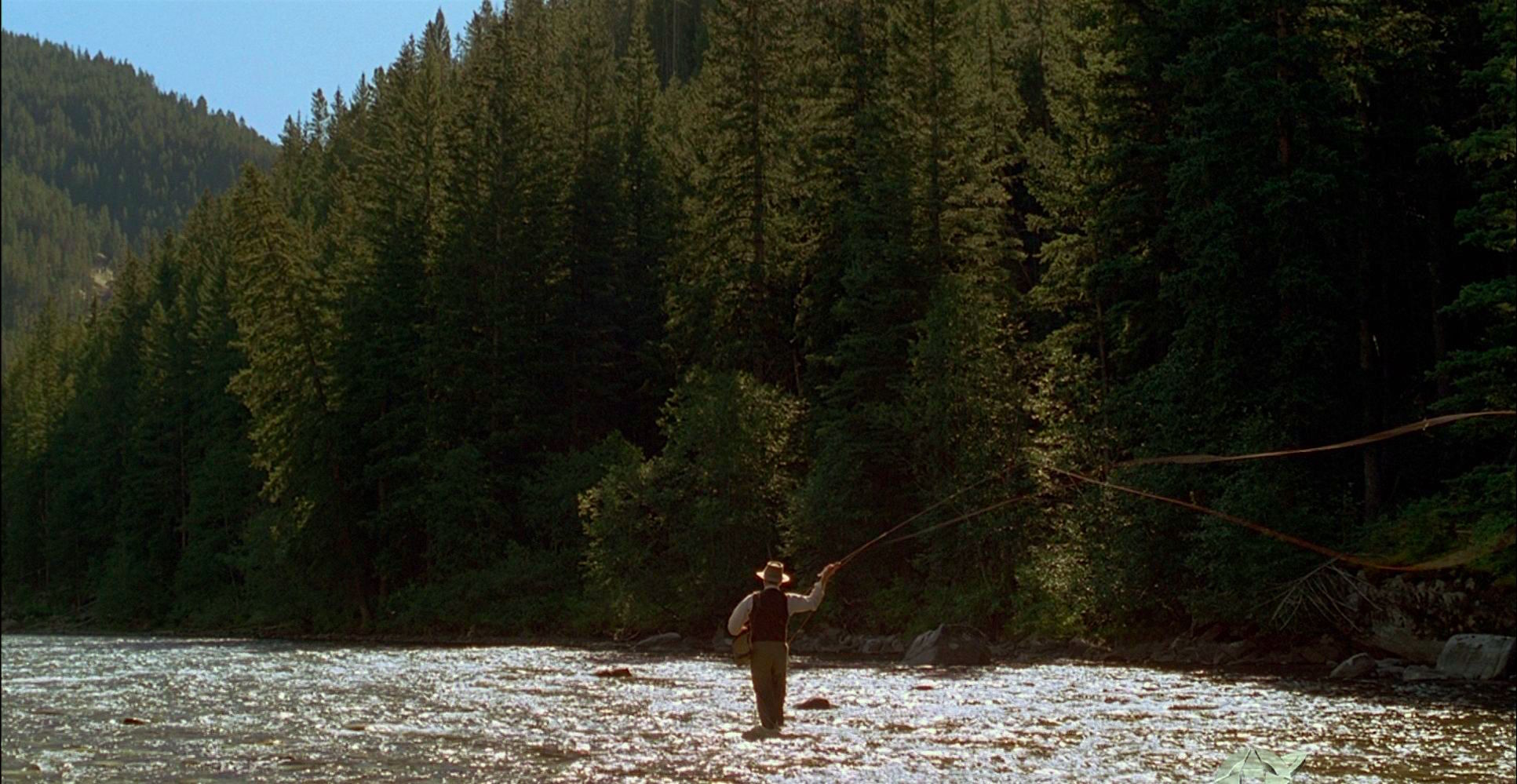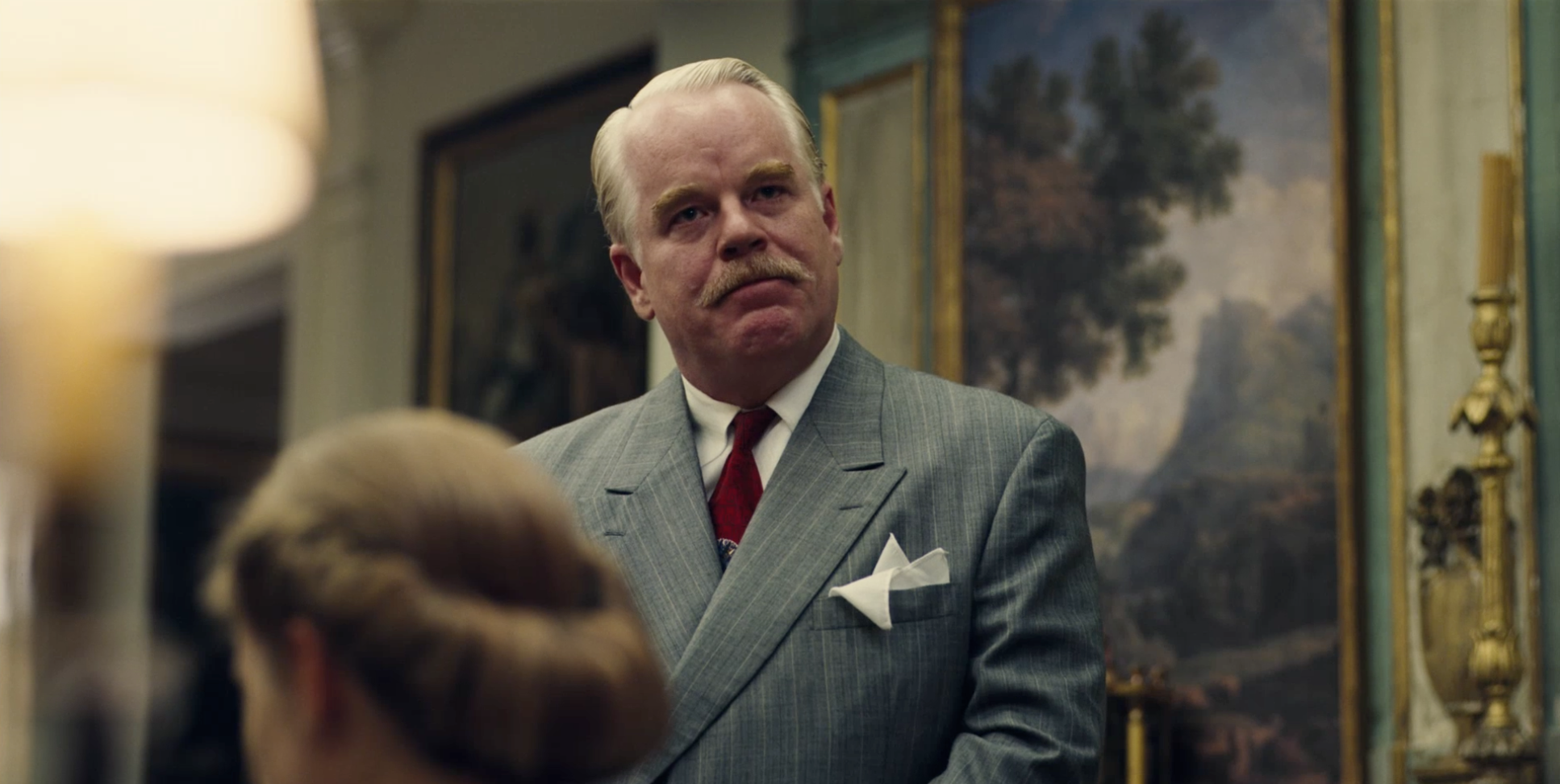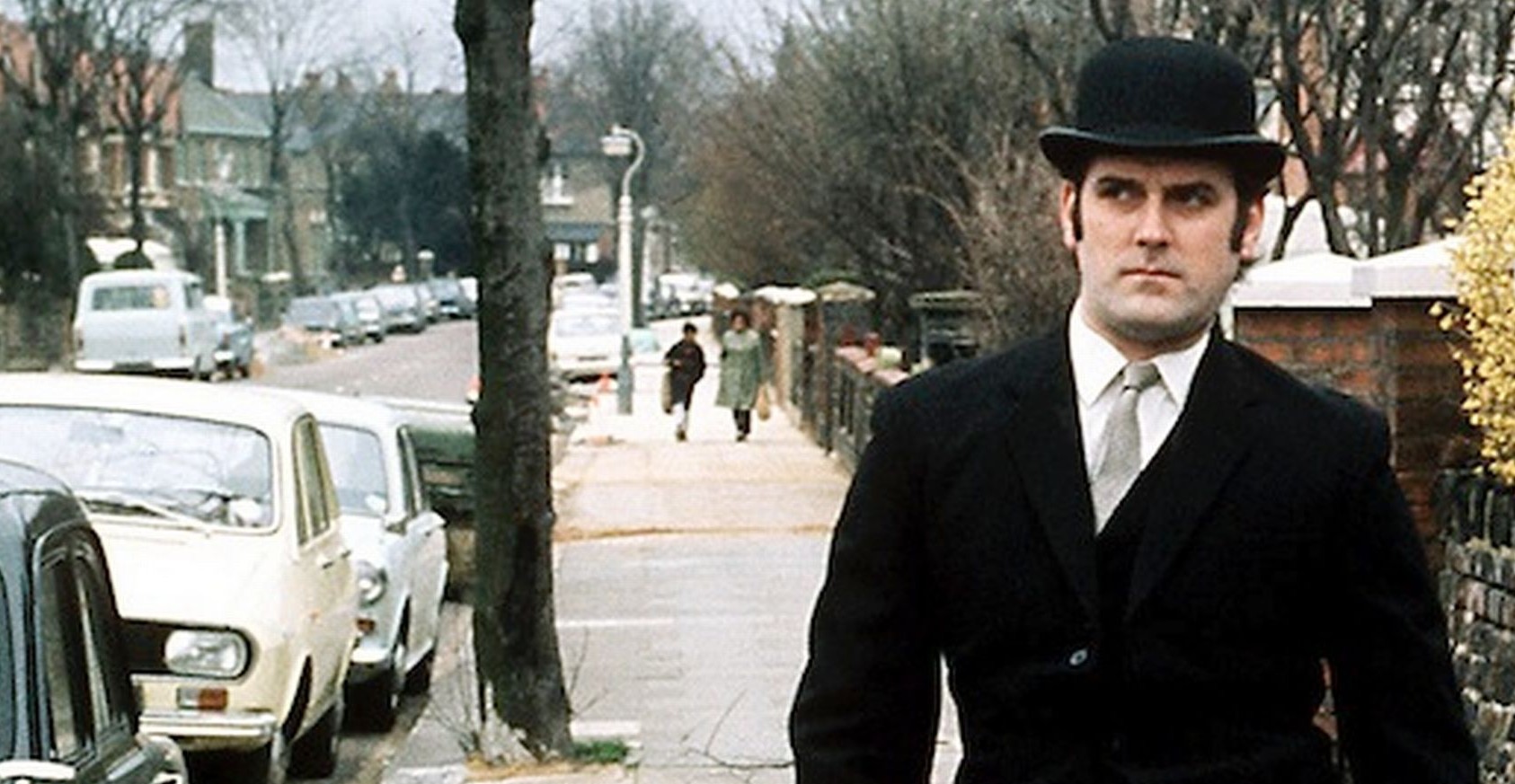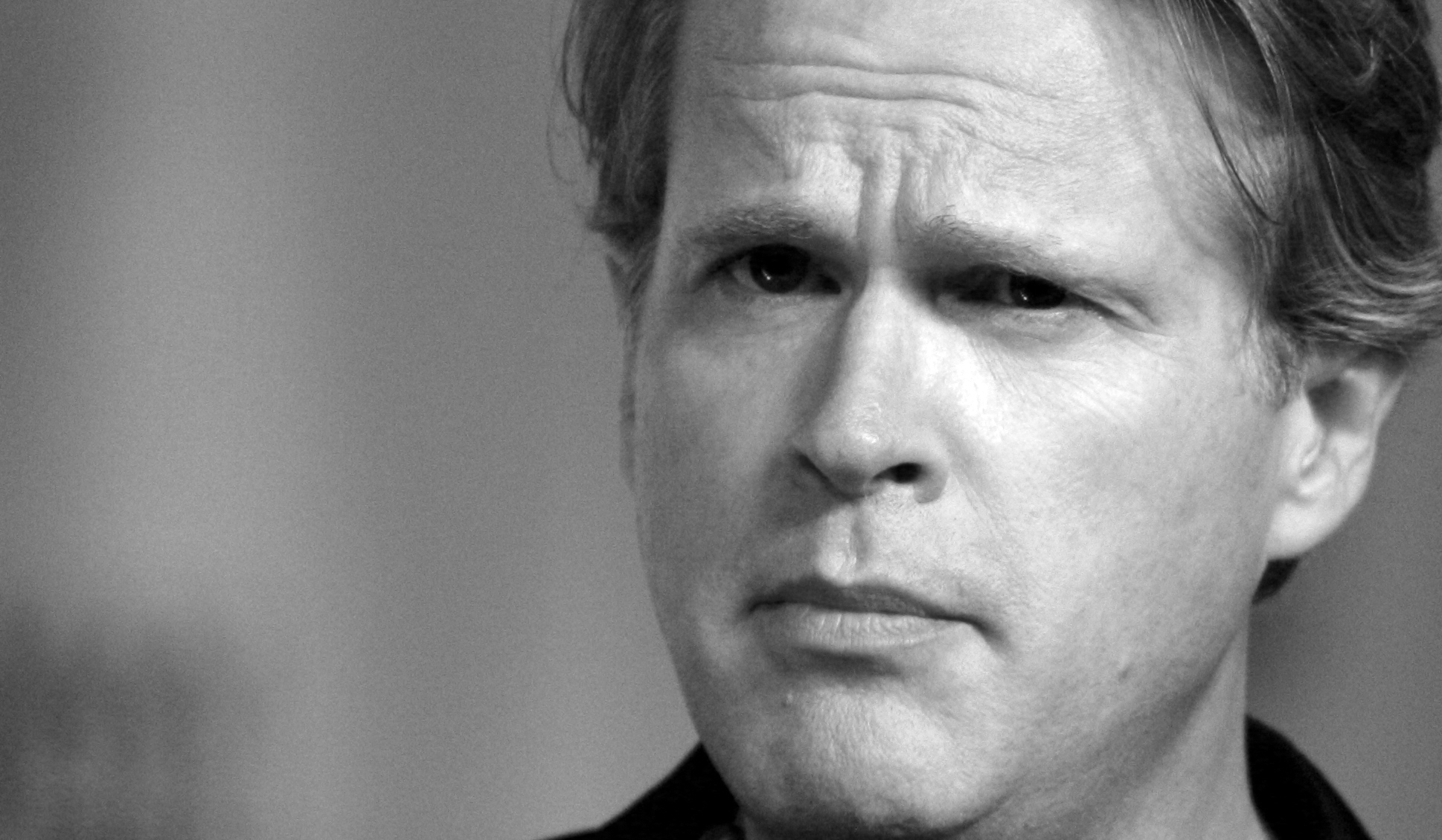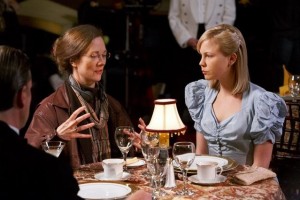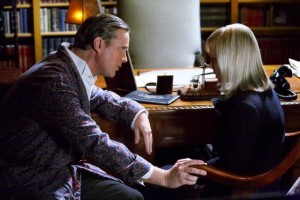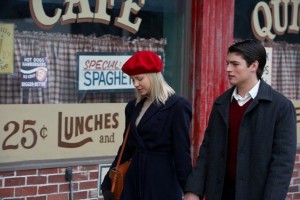Trailermania: Anomalisa, The Wonders, & more
Let's look at some new trailers and see if we like the smell of what these studios have cooking. Post your reactions, or your new favorite trailers, in the Comments.
Anomalisa:
https://www.youtube.com/watch?v=DT6QJaS2a-U
They had me at "Charlie Kaufman." Somehow, Kaufman's Eternal Sunshine of the Spotless Mind still feels fresh and innovative more than a decade later. I admire (although "enjoy" might be inaccurate) much about Being John Malkovich, Adaptation, and Synecdoche, New York, as well.
But they really seal the deal with these endorsements from reputable reviewers (those that appear in the trailer and on the poster).
Usually, if you're leaning in close to read the fine print, you'll see that the raves included in movie advertisements are usually coming from no-name "critics" who work for publications that have no credibility in the community of film critics. But these... these are impressive accolades from some of the most discerning film critics writing reviews today.
And then there's the animation — subtle, unassuming, lovingly crafted throughout.
So? This is near the top of my must-see list for the remaining weeks of 2015. I'll be there opening weekend, if I can manage it.
•
The Wonders:
https://www.youtube.com/watch?v=TprTVWZF2E0
The confident naturalism of this trailer persuades me that the film will take me to a believable place. The premise seems like something I haven't seen before. The character of the father wanting to hold back his daughter from creative expression looks like it might threaten to turn this into a Billy Elliott kind of "kid defies the odds to become an artist and escape confining traditions" routine, but I think there's enough here to pull me in.
However — and this is a big however — this trailer is telling me far too much of the story. Unless there's some cleverness here to obscure the actual story arc, I feel like I've seen too much and I know right where it's going.
So? I'm intrigued. And Monica Belucci is usually a major plus. But I'm not going to rush out to see it. I'll see if the trailers suggest there's more to the story than what they just showed me.
•
I Smile Back:
https://www.youtube.com/watch?v=YIBqq-AQcE0
Wow. First I've heard of this one! I'm intrigued right away. I feared this was just another exhibition of Sarah Silverman's snark. But she's playing against type here, taking a bold step into a dramatic role. Comedians, if they know how to rein in their impulsiveness and serve original characters, can often make sensational dramatic actors. That's been true for Robin Williams, Steve Martin, Jim Carrey, and even Will Ferrell. I'd love to see this become Sarah Silverman's first step into a larger world.
I like how this trailer refrains from spelling out the whole story arc. I really don't know how this will end up. I can't discern the sequence of events.
The cast looks to be chosen for how they fit the characters and for how they work together, not for their celebrity status. With the exception of the potential-car-wreck flashes, which have become an easy button-pushing tactic in trailers, I'm surprised by almost everything here.
So? I hope it's as good as it looks. I want to see it.
•
The Lady in the Van:
https://www.youtube.com/watch?v=F0NVC5OMrBM
On the one hand, this looks like the kind of movie that has been carefully calculated for Oscar potential. Maggie Smith is a sentimental favorite, still riding a high thanks to fans of Harry Potter and Downton Abbey, and if she performs well here she'll get a lot of "She's got it coming" votes for awards. And this looks like England the way American moviegoers like it: Stereotypically stuffy and witty, full of simplistic characters.
But on the other hand, this is directed by Nicholas Hytner, who has had hits and misses, but The Madness of King George was remarkable.
So? I feel like I've seen a lot of the movie here. But I wonder... could this be more than just an easy heart-warmer for tourists and Downtown Abbey fans? I'm feeling cautiously curious.
Holy Scary Movies, Vampire Bat-man!
I can't think of a better way to observe Halloween than to revisit 2011's Arts and Faith Top 25 Horror Films list, hosted by Image.
Are there any films from the last four years that you think deserve a place on this list? What about Scott Derrickson's Sinister? Or maybe a movie that horror fans might not think of... like Upstream Color or The Master?
Here's the introduction that I wrote for the list (originally published at Good Letters, the Image blog). It's best if you read it aloud in your best Vincent Price voice while haunting organ music plays in the background and a faint heartbeat pulses from within a nearby wall.
•
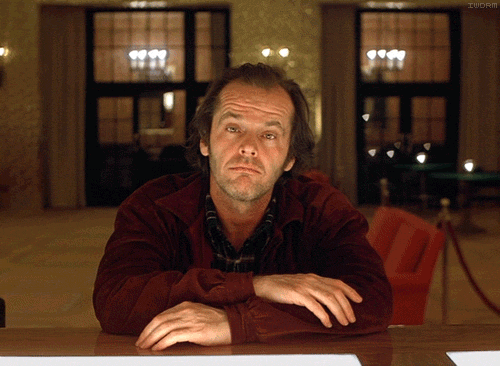 Evil spirits. Mr. Hyde and Hannibal Lecter. Face-huggers and blood-suckers. Norman Bates and, yes, you guessed it—“heeeeeere’s Johnny!"
Evil spirits. Mr. Hyde and Hannibal Lecter. Face-huggers and blood-suckers. Norman Bates and, yes, you guessed it—“heeeeeere’s Johnny!"
Many of classic characters from the world of horror films are present and accounted for in The Arts and Faith Top 25 Horror Movies, a list that is likely to prompt a variety of questions.
Questions like:
• Who’s responsible for this list?
• Why would a Christian community care about horror films?
• What do scary movies have in common with faith?
• Why in the world should I spend time watching movies as dark and disturbing as these?
Individuals in the ArtsandFaith.com community would offer a variety of answers. Allow me to share a few of my own.
Whose list is this?
It comes from the community at ArtsandFaith.com, a perpetual conversation that began in 1999. Participants at “A&F” are passionate about the art of filmmaking, and about the themes and questions that movies explore.
Among them you’ll find film critics, playwrights, professors, parents, pastors, novelists, graphic designers, even a filmmaker with two blockbusters on his résumé. And they don’t just talk to each other; their voices have been heard in publications like Paste, Salon, Sojourners, The National Catholic Register, Christianity Today, Books & Culture, and Image.
We already have the Arts and Faith Top 100 Movies list. Why this additional list focusing on horror?
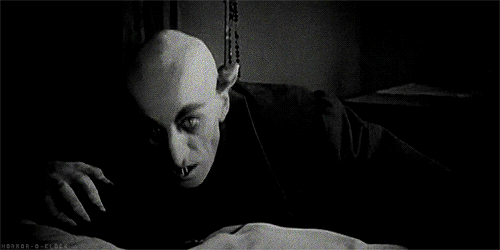 The A&F community decided it would be a good idea to begin offering specialty lists that highlight the importance of certain themes and genres. This list of big-screen nightmares is just the beginning.
The A&F community decided it would be a good idea to begin offering specialty lists that highlight the importance of certain themes and genres. This list of big-screen nightmares is just the beginning.
It may seem strange, but horror movies are important to this community for the way they can raise and address vital questions about human nature, addiction, spiritual forces, death, the afterlife, and the wages of sin.
If these subjects were not relevant to our lives, horror movies would not frighten us so much.
Can you explain why these 25 films are meaningful?
We spent weeks debating the merits of these films. Our various interpretations of each one could fill a series of books. (Be sure to read the summaries linked to each title.)
I’ll share some thoughts on #19: Alien, the science fiction classic directed by Ridley Scott.
When the crew of the spaceship Nostromo finds the ruins of a human settlement, they discover that monsters have slaughtered most of the inhabitants. But some are still alive, their bodies serving as nesting pods for the aliens’ offspring.
Yeah, it’s disgusting. The team, properly horrified, flees the scene.
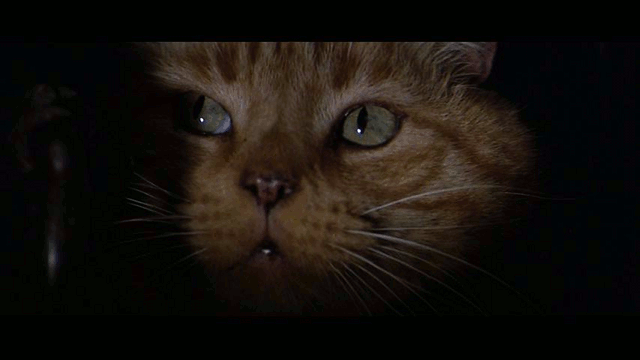 When one of the predators shows up on the Nostromo, Officer Ripley (Sigourney Weaver) gets suspicious. She confronts the ship’s science officer, Ash (Ian Holm), and he confesses a horrible conspiracy. He’s bringing one of the aliens back to earth so that a corporation can study its predatory powers. He’s to succeed even if it costs his shipmates their lives.
When one of the predators shows up on the Nostromo, Officer Ripley (Sigourney Weaver) gets suspicious. She confronts the ship’s science officer, Ash (Ian Holm), and he confesses a horrible conspiracy. He’s bringing one of the aliens back to earth so that a corporation can study its predatory powers. He’s to succeed even if it costs his shipmates their lives.
Ripley asks, “How do we kill it?”
Ash’s answer is chilling. “You still don’t understand what you’re dealing with, do you? Perfect organism. Its structural perfection is matched only by its hostility.”
How could anyone call this vicious predator “perfect”?
Ash explains: “I admire its purity.... A survivor...unclouded by conscience, remorse, or delusions of morality.”
In this way, Alien poses an important question: Should we accept or reject Ash’s worldview?
If there is no God, and we’re living in a big game called “Survival of the Fittest,” surely this resilient monster is an admirable evolutionary achievement. But what if “perfection” is about something more than physical strength and survival skills? Doesn’t that suggest there is something more going on in the cosmos?
We recoil from the alien. We recoil from Ash when he praises it. Just as our whole body responds in the presence of beauty, we are hard-wired to feel revulsion when we witness perversion. Such reactions reinforce our convictions about good and evil.
Don’t overlook the film’s revelations about Ash’s true nature. He is working with a cold, dead heart. He is merely an intellect. He is thus the perfect representative for a corporation driven solely by reason. There is no conscience burning within him. No wonder his name is Ash.
By discomforting us, Alien forces us to consider what we really believe. And its tagline may be its most perverse suggestion: “In space, no one can hear you scream.”
We want to believe that such a claim is false.
Shouldn’t good Christians avoid depictions of such violence and depravity?
Think about it. What is the central image of Christian faith?
The cross. The blameless Son of God — a truly "perfect organism" — was nailed to that wooden plank and raised up, naked and bleeding, for the amusement of his scornful community.
What could be more horrific?
We cringe at the thought of our capacity for evil. And that discomfort is useful. It’s a distress call. We’re compelled to seek a cure for our disease, to seek the reconciliation of a dismembered world.
As a young Christian, I was often told to avoid dark and scary stories, and to shield myself from images of monsters and human cruelty. I was frequently instructed to obey Ephesians 5:11: “Have nothing to do with the unfruitful deeds of darkness.”
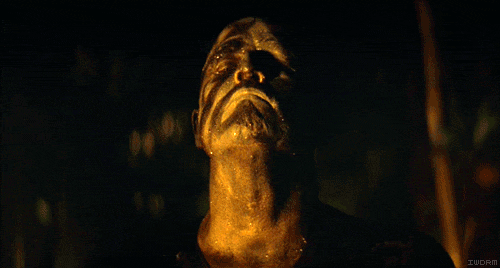 But I rebelled. I was fascinated with Apocalypse Now and The Thing. They made me insecure. They made me think about how we should respond to evil in the world. They challenged my faith.
But I rebelled. I was fascinated with Apocalypse Now and The Thing. They made me insecure. They made me think about how we should respond to evil in the world. They challenged my faith.
Eventually, I noticed that there is more to Ephesians 5:11. It actually says, “Have nothing to do with the unfruitful deeds of darkness, but instead even expose them.”
A good doctor would tell you to avoid cancer. But he wouldn’t tell you to be ignorant about the nature of cancer. Nor would he warn you to avoid thinking about how to prevent it.
Like Virgil serving as Dante’s tour guide through hell, or Hamlet confronting his murderous uncle with a play about a murder, conscientious artists are sometimes moved to expose the ugly truth. This can be an act of social responsibility...even love.
So... you’re encouraging us to hurry out and catch the latest horror movie?
Of course not.
Many horror movies are lurid and gratuitous—even pornographic. They appeal to our baser appetites. In his preface to The Screwtape Letters, C.S. Lewis wrote, “There are two equal and opposite errors into which our race can fall about the devils. One is to disbelieve in their existence. The other is to believe, and to feel an excessive and unhealthy interest in them.”
But horror movies can do more than just frighten us. They can ask us to move beyond terror into contemplation, where fear of separation from God becomes the beginning of wisdom. Filmmaker David Cronenberg says, “I think of horror films as art, as films of confrontation. Films that make you confront aspects of your own life that are difficult to face.”
We would do well to pay attention. A movie like Apocalypse Now can scare us with visions of human depravity. “The horror! The horror!” But our tendency to scream when we’re frightened is a good thing. It’s an expression of hope. We scream because we think somebody might be listening.
Even in space.
•
And now... on a lighter note...
https://www.youtube.com/watch?v=uzolCu-QLw0
A River Runs Through It (1992)
Twenty three years ago today, A River Runs Through It opened in theaters. I was there. And I'm still there, walking along those rivers in Montana, re-reading Norman Maclean's beautiful fusion of memoir and fiction, revisiting Robert Redford's masterpiece. I'm usually reluctant to use that word about a movie that's younger than 30 years, but I think the rarity of this film's tenderness, grace, ensemble chemistry, and cinematography earn it. I wonder if we'll see anything like it again.
This review was originally published at Good Letters, the blog hosted by Image.
•
In our family, there was no clear line between religion and fly fishing. We lived at the junction of great trout rivers in western Montana, and our father was a Presbyterian minister and a fly fisherman who tied his own flies and taught others…”
Whether you’re a moviegoer or a reader, I suspect you’ll recognize that passage. It opens A River Runs Through It, and Robert Redford reads it with appropriate reverence in the beloved big-screen adaptation he directed.
It sets the stage for a story about a family living between the rivers of religion and art. And although I’ve always been a city boy, this story set in the great outdoors, has felt like a gift meant for me. In fact, the film opened on October 30, 1992* — just after my twenty-second birthday.
Last week, I sat my forty-two-year-old self down to watch this twenty-year-old picture once again, and it moved through me more powerfully than ever. Basking in Phillipe Rousselot’s patient, observant, Oscar-winning cinematography, I experienced a mysterious solace.
I was already familiar with Norman Maclean’s semi-autobiographical story. One of my English professors had celebrated its exemplary prose, and I follow his example in my own fiction workshops, holding up Maclean’s work as storytelling worthy of study.
But the film, which expands this story of the pastor and his sons, moves me even more. The story, told with such patience that it feels spacious compared to almost all popular American movies since then, explores the central tensions of my own life.
The Maclean family resembles mine — a father who teaches the scriptures, a mother who serves the family with selfless generosity, and two boys who pursue artistic aspirations on different paths. (The Maclean boys part ways over literature and fishing; I chose literature, my brother chose music.)
While Paul, the youngest Maclean brother, becomes a masterful fisherman, he also becomes dangerously irresponsible with alcohol, women, and money. I’m grateful that my brother and I have, by God’s grace, never fallen into Paul’s relentless rebelliousness. We’re both more like Norman, the older brother, deeply rooted in the teachings of our family, our school, and the Baptist church of our childhood.
The fishing scenes in Redford’s film, which are as graceful as Maclean’s prose, always prompt me to think about my own writing life. We watch these fishermen tie their own flies—an art both practical and aesthetically beautiful. Then we watch them cast their gleaming lines into the wind, watch the lines settle into the water, watch this mysterious ritual draw up mysteries from the deep until revelations break the surface and dance in the sun.
While I still feel like an apprentice at prose, I’ve come to value the rituals of discipline, just as the Maclean boys practice the art of casting. Those who aspire to be writers but have no patience for the study of grammar and punctuation remind me of those who vow to follow Jesus but have no respect for religious tradition.
I fling a line of words out over mysterious currents, hoping to catch something big and beautiful. Having practiced for many thousands of hours, I find that the fundamentals come naturally now. I can improvise and make new discoveries, learn what more is possible. Sometimes, I catch something. And I lose myself, swept away by light and motion, until I return with a blessing and deep gratitude.
But another aspect of the film intrigues me this time. Maclean describes the Presbyterian minister as emerging from a church service “anxious to be on the hills where he could restore his soul and be filled again to overflowing.”
This rings true. How many times have I looked out the church window and longed to be at the ocean’s edge, or hiking to a peak? As a child, I endured sermons by drawing pictures of the natural world. Growing up, I’ve often been troubled by the great divide between the rivers of art and religion in my life.
Why have I experienced more profound revelations of God’s presence in art than in Sunday morning worship?
I’m not criticizing former churches. On the contrary, I’m grateful for the teaching I’ve received in pews of my childhood Baptist church and the Presbyterian church I called home for almost two decades. There I’ve learned the fundamentals of what it means to be the body of Christ.
But 2012 has been a season of unprecedented hardship for my wife and me. I have struggled in my faith, work, and art. And both of us have felt drawn into a new and unfamiliar sanctuary — a space alive with beauty and mystery, where the line between religion and art is all but impossible to discern.
In our new Sunday destination, the congregation gathers in reverent anticipation rather than social chatter, as if something extraordinary is about to occur. Currents of incense wind through the air. We observe more than moments of silence, we sink into long pauses, listening for the words of God that the Reverend Maclean insists we might hear beneath the rocks of the riverbed. We kneel, rise, and turn as if in a ceremonial dance. We give voice to scriptures and prayers so beautiful that they unite believers across continents and centuries.
Afterward, rather than commenting on the pastor’s “performance,” or catching up on the week’s most dramatic developments, I emerge nearly speechless (a condition which is, my friends will tell you, quite uncharacteristic). I carry a sense of sacred mystery similar to what I feel after my own Montana excursions. I’ve been blessed with more than a message; I’ve engaged with all of my senses. Now the ears of my ears are awake . . . the eyes of my eyes are open.
I don’t know how long we’ll worship in this sanctuary. But for now, I’m grateful. This art-full worship restores my soul. I am caught up wholly in the holy. And in those moments, all things merge into one. And, yes, a river runs through it.
•
*The film opened in 1992... but on what day exactly? Wikipedia reports the release date to be October 9 (my birthday). IMDB marks it at October 30.
The Master (2012): An interview
[This dialogue on Paul Thomas Anderson's The Master — originally titled "Wrestling the Master" — was first published at the Image blog: Good Letters, and it stirred up a lot of comments and conversation there. The film had just been released in theaters. Today — October 28, 2015, Joaquin Phoenix's birthday — seems like a good occasion to post it here at Looking Closer. The Master is now easily accessible on blu-ray, DVD, and streaming platforms.]
•
I found myself in this strange conversation this week….
Interviewer: Do you recommend The Master?
Jeffrey Overstreet: Not yet. I need time to reflect on a film as challenging as this one. I need discussion. I need to see it again.
Reviewing movies is a tricky business. It’s like recommending a pair of shoes to an audience. The shoes may be well-made, but people may dislike their style or misunderstand their purpose. Even the best shoes will only fit certain people.
Interviewer: First impressions?
JO: Difficult, but often riveting. Cinematography, music, editing . . . the artistry often reminded me of Kubrick, Malick, even Welles. Joaquin Phoenix was astonishing. The fragmented narrative demanded hard work. Some scenes amazed me. Others…
Interviewer: Offended you?
JO: Confused me. I didn’t understand their purpose. Sometimes it seemed the storyteller wasn’t sure where to go next. But hey, I’d rather follow a risk-taking explorer than a by-the-numbers crowd pleaser. Complicated art films often puzzle me at first, but subsequent viewings are usually quite revealing. Many of my favorite films didn’t work for me until a second, or sixth, viewing.
Interviewer: I saw The Master too. Thought it was disgusting. Right away, we have to watch a soldier sculpt a sandcastle woman and then fake having sex with her to the amusement of his fellow soldiers. Then he walks into the ocean and—
JO: Yeah, I remember Freddie’s ugly sexual antics. He’s driven by lust. He’s a womanizer. And he’s perverse when he’s on a testosterone high around other reckless men.
Interviewer: I don’t need to watch that stuff.
JO: You certainly don’t. If the movie troubled your conscience, you were right to leave.
Interviewer: But you stayed. There’s no excuse for that.
JO: Hold on; let’s not get judgmental. What’s offensive to you may be, by my lights, a meaningful part of a whole. And what you enjoy every week—say, professional football—might provoke me to anger or expletives. I think it’s in First Corinthians: “Everything is permissible for me, but not everything is beneficial. . . . Everything is permissible for me, but I will not be mastered by anything.”
Interviewer: What could possibly be beneficial about such an ugly movie?
JO: I believe we’re shown Freddie Quell’s pathetic misbehavior so that we’ll ask, “Why does he behave this way?”
One possible answer: He’s almost perpetually drunk on cocktails he’s made from fuel and paint thinner. So we might ask, “Why does he drink like that?”
Consider this—Freddie’s nation, his “Master”—sent him into war, into trauma, into horrors he can’t shake. When he returns, doctors test his mental health, but fail to provide the help he obviously needs.
Also, he’s burdened with memories of a troubled family history. He’s explosively angry around those who enjoy the success, the family, the blessings he’s never likely to obtain. (As a photographer, he sees so much that’s beyond his reach.)
And the war took away something he thought was true love.
Maybe he drinks to numb the pain.
Maybe we should be as disturbed, or more disturbed, by systemic failures that take a lost soul like Freddie off to "serve his country" and allow him to deteriorate without guidance or care. Maybe it's easier to despise the abandoned child than to challenge the authorities who think that he can just magically raise himself up in the ways that he should go.
Interviewer: It’s all so awful and depressing.
JO: Sure. Brokenness, depression, sexual obsession, alcoholism, violence—all rich subjects for artists to explore in search of understanding. There are people like Freddie all around us.
And that’s all prologue.
Freddie then stumbles drunkenly into the influence of a sanctimonious philosopher named Lancaster Dodd. Dodd’s impressed with Freddie’s cocktail experiments. It’s like what he does—mixing religious ideas into intoxicating philosophies. He wins many followers eager to numb their own pain, put their pasts behind them, and pursue perfection.
But even though Dodd enlists Freddie as a guinea pig, it’s obvious that Freddie isn’t getting better under his new master’s care. He becomes like Dodd’s trained monkey, stuck in a cage that he reinforces with reckless behavior.
Dodd’s in a cage too—he made it himself. He’s surrounded by admirers, not friends, who sometimes believe in his ideas more than he does.
So it’s a story about a wretch who, like me, wants to get better, but repeats his mistakes. And it’s about an egomaniac who, like me at my worst, exploits others for his own success.
Which man is more monstrous?
Interviewer: What good can possibly come from such a sick and twisted movie?
JO: I don’t think the movie is sick and twisted. I think it’s an observant film about sick and twisted people. Rather than moving through their pain, they numb it with alcohol, testosterone, ego, and control issues.
Again, if such stuff troubles your conscience, steer clear. But Freddie’s frightful lust may work like the murder Hamlet stages for a royal audience: It can force arrogant and lustful men to see themselves in the mirror.
Further, Freddie and Dodd’s relationship can offer useful, powerful reflections of what can happen between fathers and sons, teachers and students, bosses and employees, pastors and congregants, leaders and nations.
Someone suggested that Freddie might even be a younger version of Dodd, come to haunt him. Maybe Dodd is seeking to control and reform his younger self—one delusional and dangerous man influencing another.
Interviewer: You don’t know who I am, do you?
JO: I do. You’re my younger self.
You used to stand up in church and rant about the evils of “worldly” art. You condemned whatever made you uncomfortable.
But thanks to trustworthy teachers and inspiring artists, you will learn to recognize the difference between condoning evil and exposing it. From the Bible, Shakespeare, Flannery O’Connor, and more, you’ll follow monstrous characters toward the consequences of their hypocrisy, lies, lust, and self-righteousness.
You see, I learned a lot about light by thinking about shadows.
Interviewer: So, like Dodd, you’ve become a sanctimonious philosopher.
JO: I hope not. Like I said, I’m a beginner. I’m still learning.
God save us all from becoming like “the Master”—someone who treats those who disagree with him as enemies, who calls them names and spews vitriol.
We explore a movie as if we were exploring a forest—we all find different paths, troubles, and rewards. Best to share our experiences humbly. Otherwise, we’ll make people want to walk out on us… as if we were a terrible movie.
Looking Elsewhere: October 28, 2015
President Barack Obama and author Marilynne Robinson continue their substantial conversation about literature, democracy, and hope in The New York Review of Books. Part One, if you missed it, is here. You can download the audio of both parts on iTunes.
•
One of film criticism's giants — Philip French — has passed away. Variety's Guy Lodge looks back at his remarkable career.
He was to Britain as trusted and treasured a film guide and educator as Roger Ebert was to America.... It’s the kind of sustained, storied career that hardly seems imaginable in the current climate of film criticism, continuing even after his official retirement.... His very last published words, posted on Sunday, were in celebration of the delicious 1955 Ealing comedy The Ladykillers — as fittingly bright and British a note as French could have hoped to go out on.
When French stepped down from his job at the Observer after 50 years of writing, The Guardian's appreciation of his work included some striking quotations: "No critic should ever say they are bored," he said. "It is not enough just to understand a film; you must try to say something of interest or value." Later, they note his belief that critics should not talk down to readers. "You should assume your reader is intelligent, but not necessarily as well-informed, since they spend their days doing something else for a living." I smiled and nodded at the last words of this paragraph:
French's status as a repository of film knowledge means he has been asked to draw up many top 10 lists, from the best dogs on film ... to the best leading actors. In the latter he would place Michael Redgrave – star of an all-time favourite, Hitchcock's The Lady Vanishes – Spencer Tracy, especially for Bad Day at Black Rock, Gary Cooper for High Noon and Henry Fonda for Twelve Angry Men. He also admires Lee Marvin, Al Pacino and Warren Oates. More recently, he salutes the talents of Ryan Gosling and of Leonardo DiCaprio, who, he says "has suddenly started to do it".
•

As they develop their next full-length album, The Welcome Wagon — whose last record I really loved — are giving away some of their new songs at NoiseTrade.
•
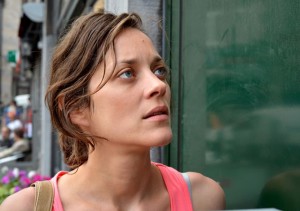 A.G. Harmon, at Good Letters, writes about the latest movie from my favorite living filmmakers: Two Days, One Night by Jean-Pierre and Luc Dardenne:
A.G. Harmon, at Good Letters, writes about the latest movie from my favorite living filmmakers: Two Days, One Night by Jean-Pierre and Luc Dardenne:
What is best about the film is the portrayal of the herculean toil that goes into the living of everyday people. These are lower-middle-class workers, and yet their story is as deep as any Greek tragedy, and their triumphs as large as any Greek epic’s. Sandra rivals any heroine of antiquity, and she does so in the working environs of suburbia, among the graceless and pedestrian and commonplace.
•
At Crux, Steven Greydanus looks back at the whole Back to the Future trilogy:
The point, of course, is that the more things change, the more they stay the same; that parents and children are not so different as the latter might think and even as the former might pretend.
Moreover, the 1950s weren’t as different from the 1980s as it might seem. The sexual revolution of the 1960s changed many things, but it was a change in attitudes, not human nature.
•
Chuck Bowen at Slant offers detailed impressions of, and reflections on, Criterion's long-awaited release of David Lynch's disturbing, confounding, and extraordinary Mulholland Drive.
Mulholland Drive has been read as a deconstruction of the way that Hollywood eats women alive, turning them on each other and themselves, favoring the men pulling the levers behind the scenes, and it certainly is that, to the point that you wonder if Lynch's offering a free-associative mea culpa for the lurid, hard-edged sexuality of some of his other films. In the greatest scene of his career, Lynch stages an acute examination of sex as a woman's enforced social defense, a simultaneous instrument of marginalization and empowerment.
...
Like Betty, Lynch's in love with his fantasies, but he recognizes many of them, particularly as shaped by corporate Hollywood, to be built on nightmares, complicating the pleasure they bring. With this epic tapestry, one of the richest, finest, and most bottomless of all films, Lynch channeled the elusive and contradictory textures of desire, moving beyond either/or dichotomies of good and evil or black and white. Or brunette and blonde.
•
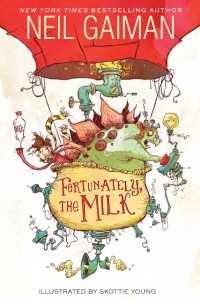 Via David Hudson's Keyframe Daily at Fandor, here are three news bits that made me sit up straight:
Via David Hudson's Keyframe Daily at Fandor, here are three news bits that made me sit up straight:
Johnny Depp may star in an Edgar Wright-directed adaptation of Neil Gaiman’s Fortunately, the Milk. That's from Dave McNary at Variety.
I'll be in line for anything that Edgar Wright directs. And Neil Gaiman sweetens the deal. But it's been a while since I've seen a movie in which Johnny Depp was a strength instead of a weakness.
George Clooney might direct Suburbicon, a 1950s noir written by the Coen brothers. That's from Mike Fleming Jr. at Deadline.
I like every single detail of that news.
And then there's this at ScreenDaily: An update on an upcoming English-language sci-fi film from Claire Denis!
Now this is podcasting!
Have you felt it? A strange kindling of the Force?
On November 9: Longtime Kindlings Muse podcast host Dick Staub emerges from his Orcas Island home and returns to Hales Brewery & Pub in Seattle to join the new host — Seattle Pacific University's Dr. Jeff Keuss — along with Star Wars superfan Carlo Nakar, and me ... as we sit down with good company, good food, and good beverages, to become mindful of the Star Wars saga together.
We will try not to awaken the Force early as we discuss the upcoming blockbuster... because if the Force is awakened before its alarm goes off it will get really, really angry.

We will ponder these questions:
Can we trust J.J. Abrams? Is the Force strong in him?
What about Lawrence Kasdan? Sure, he co-wrote The Empire Strikes Back, but he is also responsible for Dreamcatcher and Darling Companion, so...
Is this just going to be a nostalgia-fest? Or are there good reasons for a new hope?
What does Star Wars really mean anymore? Why did we fall in love with it in the first place? How many Star Wars toys do we still keep in storage?
And we will answer your questions.
Tickets for our live podcast event are available now.

The wisdom of John Cleese
Happy birthday, Master Cleese! It's easier to believe in a benevolent God because the world gets to enjoy your brilliant company.
Since we can't celebrate with you in person, we will instead sit at your feet and learn from you.
https://www.youtube.com/watch?v=nL0dmBy5qTw
https://www.youtube.com/watch?v=Qby0ed4aVpo
Cary Elwes made a Madeleine L'Engle movie?
Today is the birthday of Cary Elwes — best known (whether he likes it or not) as Wesley from The Princess Bride, and as the author of a new memoir: As You Wish: Inconceivable Tales from the Making of The Princess Bride.
Here's something that isn't very well known about Elwes: He recently starred in a movie based on a novel by Madeleine L'Engle.
And he's not the only accomplished actor in the film. The leading role went to up-and-comer Adelaide Clemens, who has since become a star in TV's Rectify. Samantha Mathis, Gregg Sulkin, Camryn Manheim, Star Trek: Voyager's Robert Picardo, and Colby Minifie (who will be in the upcoming Marvel series Jessica Jones) have notable supporting roles.
I interviewed Elwes in 2012 as the film Camilla Dickinson was playing at festivals. But I only just now discovered that the movie became available at the end of August on DVD and on Amazon Prime.
So now would be a much better time to read what I originally wrote about the film after interviewing director Cornelia Moore, producer Larry Estes, and actor Cary Elwes. This piece was originally published at Christianity Today.
•
Cornelia Duryée Moore's story sounds like something from a fairy tale.
"I got hit in the head with my godmother's magic wand, and she said, 'Hello, Corrie — this is what you're going to do for the rest of your life!' So I said, 'Yes, please!'"
To be more specific, Moore's godmother — Madeleine L'Engle, author of science-fiction novels (including A Wrinkle in Time and her popular Time Quartet) and inspirational memoirs — bequeathed to her a remarkable gift: the rights to adapt twelve of her early stories into plays and movies. At the time, Moore was in her third year of seminary; she promptly quit in order to attend film school instead.
And she's making it happen. Taking Camilla, a play that L'Engle wrote in her twenties and later revised into a novel, Moore has completed a wonderful film called Camilla Dickinson, which features an impressive, accomplished cast. The film is complete, but doesn't yet have a distributor or release date; Moore and her production company are now pursuing possibilities.
Camilla Who?
To L'Engle fans, Camilla is unfamiliar. But before penning the Time series, her autobiographical Crosswicks Journals, and her reflections on faith and art in Walking on Water, L'Engle wrote coming-of-age novels for young adults. They may not be as strange and speculative as her classics, but they reveal an author finding her voice and unabashedly expressing her passions to the world. (Oprah Winfrey, for one, has taken note: In the July 2009 issue of her O magazine, Camilla was highlighted as one of Oprah's "Summer's Best Reads.")
The story, set in 1948, follows Camilla — a 15-year-old trapped in the turmoil of her parents' failing marriage on New York's Upper East Side. Her mother, Rose, is childlike in her tendency to treat her daughter like a doll, and in her desire to live in a romantic fantasy. (She's having an affair with a businessman.) Meanwhile, Camilla's father, Rafferty, is withdrawn; L'Engle calls him "a glacier of a man."
Camilla, who dreams of becoming an astronomer, seeks refuge in her friendship with a spirited young woman named Luisa, and she finds escape and romance with Frank, Luisa's charismatic brother, a boy that Camilla's parents believe is "dangerous."
Filmmaker Moore believes 15-year-olds were "younger" than they are now — they were not saturated with media, and so learned about the world of adult life more slowly. Frank leads Camilla into a larger world of possibilities … and temptations.
Moore sees similarities between Camilla's story and L'Engle's own accounts of childhood. "There are large parts of Madeleine's story in this story," she says. "It's tragic and beautiful and painfully awkward, the way adolescence is. It's about flailing around and … trying to find out who you are."
Camilla is also a testament to L'Engle's faith. She never considered herself a "Christian writer" (in the sense of seeking to evangelize) but a writer who happened to be a Christian. Her stories steer clear of sentimentality and sermonizing. In Camilla Dickinson's most poignant scenes, she wrestles with big questions: Are we "accidental"? Or have we been planned? If there is a God, why does he allow bad things to happen? And what is expected of us?
"All of Madeleine's beautiful work is so full of light," says Moore. "We need more films that are full of light. I wanted to get this film made in a way that Madeleine would really love, to honor her."
'Gobsmacked' by a Great Cast
Moore found an accomplished producer in Larry Estes (Smoke Signals, The Heart of the Game), who says he appreciated Moore's "singleness of purpose about telling the stories she wanted to tell." When casting directors Kerry Barden and Paul Schnee (The Help, WinWin) joined the effort, the floodgates opened.
"We were humbled, overwhelmed, gobsmacked by how many people responded to this story," Moore says. "We were inundated with resumes and phone calls and agents and people who wanted their actors in this. We couldn't believe it when Cary Elwes walked through the door."
Elwes, most famous for playing Westley in The Princess Bride, plays Camilla's father, Rafferty. He says the project drew him in with its story of faith, coming of age, and romance—something that rarely gets the attention of studios anymore. "The only way a studio can even look at a romance is when it's 'Two goofballs finally find each other!' But what's wrong with real love, with real passion, with real feelings?"
To play Rafferty, Elwes took inspiration from people he has known who have suffered a loss of faith, who have "withdrawn into shells." But, he adds, "I had to find the empathy within the guy too. Even if you're playing someone who is without remorse, you have to find something that people can connect with on a deeply human level. I think I found it in [Rafferty's] love for his daughter."
Elwes was moved by the way Camilla's growth in faith and confidence brings hope to her parents' failing relationship. "That's what's so beautiful about it — it's Camilla who's grown up so quickly in the story and ends up teaching them a thing or two."
Samantha Mathis (TV's Curb Your Enthusiasm and Grey's Anatomy), who plays Rose, brings a "sweetness and vulnerability" to a character that could easily have been a villain, says Elwes. Rafferty, he adds, is not blameless in Rose's affair. "She's got nothing at home. He stopped watering that plant a long time ago."
The film also stars television's Robert Picardo (Star Trek: Voyager) and Camryn Manheim (The Practice) as a married couple whose joyous way of life is a reminder of L'Engle's own embrace of God's good gifts. Frank, played by Gregg Sulkin, is endearing, if a bit idealized, as Camilla's love interest. But his sister Luisa almost steals the show, played with spirit by Colby Minifie, who resembles a young Joan Cusack.
Moore says, "I feel like getting to make this movie with this cast was like getting to make a painting with Picasso's brush."
The most sought-after part was, of course, the lead. After investigating "nearly all of the young working actresses in Hollywood and New York," Moore and her team chose Adelaide Clemens, an Australian actress who has already appeared in X-Men Origins: Wolverine, HBO's The Pacific, and on television's Lie to Me.
"The minute that Adelaide opened her mouth, we looked at each other and said, 'Thank God!'" says Moore. "She did the reading, and when she left the room, we did a 'happy dance.'"
The happy surprises didn't stop there.
Many of Moore's new collaborators opened up to her about their own Christian faith. Moore was stunned "to be having theological discussions while sitting in the captain's chairs on the set." Several were quick to ask where they could attend mass before getting to work.
Elwes says he's "drawn to material that has some social or religious quality to it, that has something to say. I played [a young] Pope John Paul II in TV movie a while back. I had allowed myself to become something of a lapsed Catholic, and it really reconnected me with my faith and my individual belief in Christianity."
Moore believes there are "many, many people" in Hollywood who are open to — even enthusiastic about — material that engages faith-related themes. But, she adds, they are "starving for good material."
L'Engle's Lingering Influence
L'Engle's influence is evident even in the name of the production company behind the film — Kairos Productions. Kairos, L'Engle explains in Walking on Water, is a Greek word that describes non-chronological time, God's time, a "time outside of time."
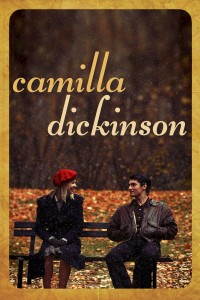 Kairos' mission statement says it's "reverently irreverent" production company, "dedicated to making movies with heart, soul, and spirit." (Moore's first Kairos production, The Dark Horse, a film for the whole family, is available.)
Kairos' mission statement says it's "reverently irreverent" production company, "dedicated to making movies with heart, soul, and spirit." (Moore's first Kairos production, The Dark Horse, a film for the whole family, is available.)
Kairos movies have "heart, soul, and spirit" because Moore herself does. Just ask Elwes: "Unfortunately, my industry is still very much an old boys' network. Corrie's the first woman director I've worked with, which I was very thrilled about. She has an incredible, beautiful spirit about her. She has a very delicate touch."
Her producer agrees. "In the independent film business," says Estes, "it's largely about being cutting-edge, pushing the envelope, being extreme, seeing how bad things can get, how depraved villains can be. So it's pleasant for me to work on something that's more about people trying to become better people."
Moore praises the Act One: Writing for Hollywood program, where she learned and grew, and the Hollywood Prayer Network. Though HPN, two women "have been praying for me for ten years. And I have a team of prayer partners listed in the credits of my movies. I am deeply in their debt, and I love them."
Now she and Kairos are focused on finding an audience.
"We need to get it to the right festivals that will attract the right buyers who will launch it into the universe," says Moore. "That is my prayer, that it will find the right spiritual home, with the right people to represent it."
Whatever studio does rise to the occasion will be giving moviegoers a gift. In Walking on Water, L'Engle says we draw people to Christ "by showing them a light that is so lovely that they want with all their hearts to know the source of it."
Camilla Dickinson is not a flashy, noisy movie. But it is full of the light that L'Engle reflected in her work. It's easy to imagine that she is watching Moore's progress and smiling.
Why we need The Innocence Mission
What's your favorite Innocence Mission song? If you have one, post a comment. I'll share a few of mine, but first I encourage you to zip over to Christ and Pop Culture to read my impressions of what turns out to be a sort of 30th anniversary record for the band — which, according to Wikipedia, first formed in 1985 (even though we didn't get a real record until 1989).
From today's new installment of "Listening Closer":
Lyrics about hope and comfort and the promises of God are so prevalent, so primary, so routine in Christian music that they feel like cheap sentiments, tired mantras, easy answers. They’re sentimental. They make believers feel good for their familiarity. We like to hear what we agree with, what comes easily, what lacks any complication or challenge. But the ultimate effect of such sing-alongs tends to be slight and fleeting, their influence insubstantial, for they do not acknowledge or reckon with the persistent reality of this present darkness, of the discouragements and fears and horrors that make us all acquainted with despair.
And that, class, is why we need The Innocence Mission.
So, here are a few of my favorite tracks spanning 30 years. And wow, it's surprising just what an '80s band they were when they got started:
"Mercy," from The Innocence Mission
https://www.youtube.com/watch?v=v60y7QsydYA
"Revolving Man," from Umbrella
https://www.youtube.com/watch?v=ASJqyJz8vTQ&list=RDASJqyJz8vTQ
"Now In This Hush," from Umbrella
https://www.youtube.com/watch?v=zsKM2B7lD1A
"Bright as Yellow," from Glow
https://www.youtube.com/watch?v=ArJ8809OUrA
"Everything's Different Now," from Glow
https://www.youtube.com/watch?v=ObbzT_NCy4s
"It Is Well With My Soul," from Christ is My Hope and from Now the Day is Over
https://www.youtube.com/watch?v=aV6N1dnMzwk
"Birdless," from Birds of My Neighborhood.
https://www.youtube.com/watch?v=-MPWUIU8U38
"July," from Birds of My Neighborhood.
https://www.youtube.com/watch?v=SCNp105BhEg
"I Haven't Seen This Day Before," from Birds of My Neighborhood.
https://www.youtube.com/watch?v=bXAU4Oiz0Uw
Turn it up: Your favorite scary song?
Here comes Halloween. What're some of the scariest songs you know? Add to this playlist in the Comments.
And proceed with caution. Some scary songs are fun in a costume-party, make-believe kind of way. Some are scary in ways that are useful, because they're telling the truth about disturbing matters. And then there are scary songs that actually seem designed to do us harm... and I'd rather not give those any attention.
Me, I got a bit of chill from this creepy new track by Eskimeaux: "Pocketful of Posies" from O.K.:
https://www.youtube.com/watch?v=nE7q9hX_m28
And here are some more favorites that send shivers up my spine...
This one, which is as much fun now as it was when it first crept into my ears and laid eggs:
https://www.youtube.com/watch?v=sS6t56U9tBg
Is there any rock song with scarier nails-on-a-chalkboard dissonance than Peter Gabriel's "Intruder"?
https://www.youtube.com/watch?v=vAzUh_H7yV0
And then, once in a while, the extreme creepiness of a song's lyrics can be completely undermined by the insane 1980s absurdity of the music video. Take, for instance, "Wrapped Around Your Finger," by The Police:
https://www.youtube.com/watch?v=svWINSRhQU0
Okay, enough of the 70s, 80s, and 90s. Here's a song from a recent record that is unsettling all the way through:
https://www.youtube.com/watch?v=EJSk2RySqKg
Finally, I'm just going to say a name: Nick Cave.
Where do I begin with the Nick Cave songs that scare me? Maybe here? Can you believe a song with these lyrics ended up in a Harry Potter movie?
https://www.youtube.com/watch?v=HtrKPsUlM0E

